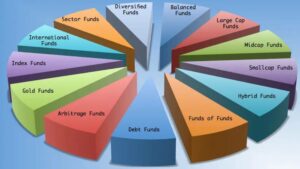By Santanu Chakraborty
Indian mutual fund investors are running out of patience as most active funds are unable to beat their benchmarks. More than 80% of the active equity funds have underperformed their benchmarks over the past five years, according to Marcellus Research. The impact of the debacle in Franklin Templeton is rankling not only the industry veterans but the investors too.
Investors are shifting from mutual funds to direct stocks and exchange traded funds at the quickest pace in the past few years lured by the prospect of higher returns, according to B. Gopkumar, managing director and CEO of Axis Securities. The average daily trading cash volume has risen from Rs 20,000 crore in FY19 to around Rs 32,000 crore this year and the average age of the investors have also declined, he said.
Nifty 50 index has rallied to its before COVID-19 levels while many of the funds are still in red. Fund managers are unable to generate alpha as they cannot invest more than 10% in a single stock and have environmental and governance concerns. The underperformance is mirroring the trend in the US where FAANG stocks have rallied 32% since January while the rest of 495 stocks have fallen 7%.
A VOX EU analysis reveals that almost 95% of active equity mutual funds underperform a variety of passive benchmarks, contradicting the popular belief that active managers outperform in downturns.
The ETFs are likely to see an inflow of more than Rs 1,000 crore in July, said Nilesh Shah, managing director of Kotak Mahindra Asset Management Co. and chairman of the Association of Mutual Funds in India. Equity mutual funds may see an outflow for the month, he said. This will be the first monthly outflows since March 2016 as per AMFI data.
Exchange and index funds seemed to have filled the gap in flows caused by equity mutual fund outflows. ETF, index funds, gold ETFs and funds of funds of overseas schemes saw total inflows of Rs 8,660 crore for the April to June quarter, according to data from the Association of Mutual Funds of India.

Experts see the surge in ETF flows as a positive indicator of the gaining acceptance of ETFs. The flows into ETF and index funds are seeing a steady increase over the years across segments. Large retirements funds such as the EPFO are actively allocating their corpus in ETFs and this bodes well for the long-term health of the markets as these flows are not tactical. Some estimates point that retirement funds are allocating nearly Rs 2500 crore per month to ETFs and Index Funds.
However, the baton for index investing seems to have gradually passed on to retailers and pensioners from institutions. So far passive investing was driven by Employees Provident Fund Organisation, life insurance, and other government disinvestment mandates, but now retail interest is gradually rising.
Nippon India Mutual Fund has seen a spurt in investor interest in their ETFs in Q1 of this year. Nippon’s investor base has increased by nearly 15% in Q1 itself and volumes in ETFs have increased significantly on the exchanges, according to the fund head. Nippon manages ETF and index assets worth Rs 27,500 crore.
ETFs and Index Funds are gaining traction because they cost lesser, are simpler and provides an avenue to invest in the best companies at that point of time, Vishal Jain added. “It’s the easiest way to ride on the India growth story.”
Consistently delivering outperformance over the benchmark is becoming difficult in case of large cap funds. Investors look to switch to passively managed ETFs or Index Funds, from large cap funds, even while they retain their allocation for mid and small cap via actively managed mutual funds.
Retail investors, especially millennials, are investing in the markets amid a coronavirus induced lockdown in a trend that has swept across the globe. The trend has come to be known as Robinhood trading. In the U.S. and Europe, a new breed of digital tech-savvy traders has emerged in the coronavirus pandemic. Brokers like Robinhood, Charles Schwab, E-Trade and others have disrupted the traditional brokerage system by offering commission-free trading and even free shares on occasion.
The retail fervor has also swept across the ETF markets. Retailers are shifting to ETFs from traditional funds as the products offer lower risk through the sector and stock diversifications and significantly lower costs compared to active funds.
Not only that. Investors now realize that ETFs offer better return prospects in an atmosphere where bank deposits rates have fallen drastically. Investors can do a mix of active and passive investments to achieve their investment objective with the help of ETFs. The ETFs are also offering an array of different products like market beta, factor indices and low volatility.
As investors flock to ETFs due to a firm belief on the India growth story, some fund houses are trying to expand liquidity to make the experience better for retail investors. A lot of frontline funds are sprucing up their ETF and index offerings as investors prefer these products over the traditional funds.
Retail investors could sometimes find it difficult to get good price discovery on the ETFs due to wider bid ask spreads. A high bid-ask spread, and low liquidity could weaken the investor experience. While a large institutional investor would realize if spreads are high and possibly wait before the trade, some retail investor, including those investing via an automated platform or robo advisors, might get some trades at unreasonable price levels in some instances. While investing in index funds, investors subscribe or redeem at the NAV of the day which is a single official rate declared without any bid-ask spreads involved.
Retail investors are benefitting from the Robinhood trend but they need to be mindful of the risks.
ETFs have got the bulk of their inflows from the corpus of the Employee Provident Fund Organisation. However, the COVID-19 induced lockdown has forced about 8 million EPFO subscribers to withdraw about Rs 30,000 crore between April and July 2020. Such large-scale redemptions may slow the inflows into ETF funds and investors need to be mindful of near-term volatility.
Santanu Chakraborty can be contacted at [email protected]





















